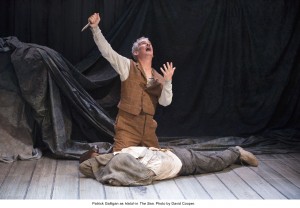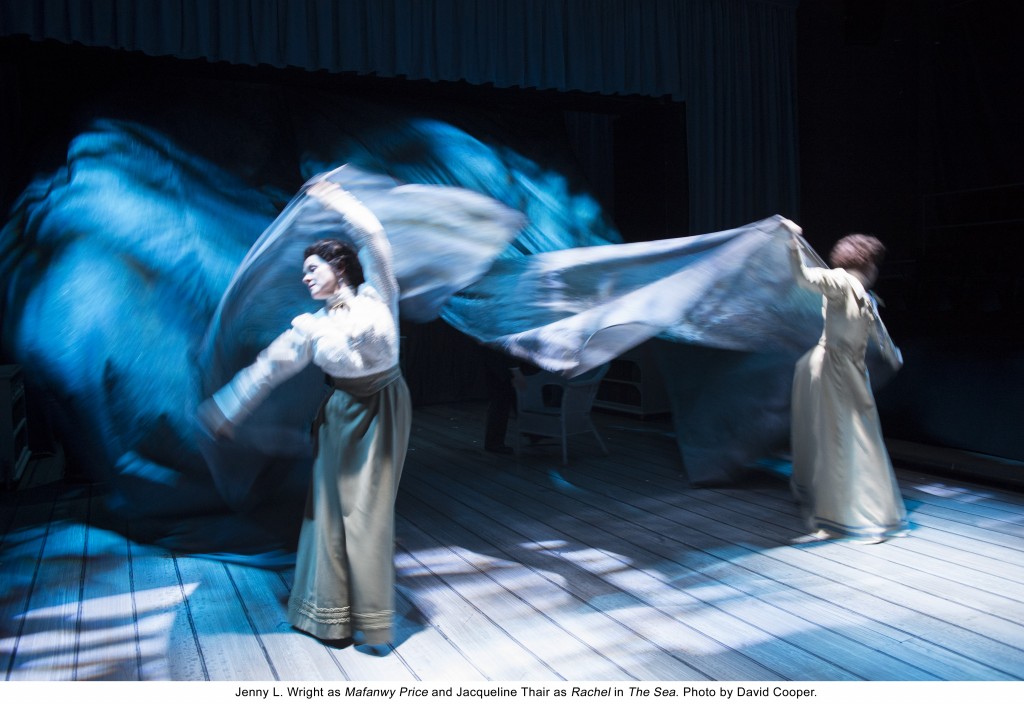
 A young man and a young woman, respectively, turn and turn a wind machine and, with increasing urgency, shake a metal sheet that one uses in theatre to effect a storm. They seem delighted with their theatrical devices and certainly, gradually, a raging wind and omnipotent thunder consume our senses in this intimate skin-clinging darkness that, at least for today, the Court House Theatre has become.
A young man and a young woman, respectively, turn and turn a wind machine and, with increasing urgency, shake a metal sheet that one uses in theatre to effect a storm. They seem delighted with their theatrical devices and certainly, gradually, a raging wind and omnipotent thunder consume our senses in this intimate skin-clinging darkness that, at least for today, the Court House Theatre has become.
A huge dark curtain, as wide as the stage, puffs and billows like a monstrous storm-incited sea toward us and one readily feels devoured by large forces perhaps more monstrous than even humanity. Indeed dark figures – who are actually both human forms and menacing ambiguities– guide the curtain with balletic grace. They become one entity with the curtain, with the darkness, with the storm, with the sea and, as our imagination takes hold, with our minds. We have here a play and a production that own us in several dimensions.
Edward Bond’s The Sea -rightly directed as potently mystical, psychologically unsparing, and magically theatrical by Eda Holmes- has able collaborators all in this outstanding realization of theatre’s thrilling potency. Camellia Koo’s bold and undeniable setting does ever-seductive metaphorical duties and we feel the battering effect of the world and the unforgiving presence of the unknown on the human body and mind. We feel entered by what we see and hear.
John Gzowski ‘s sound design and music assertively negotiate their way in both one’s emotions and one’s subconscious. Kevin Lamotte’s lighting either isolates each existence or suggests the perpetual greyness of being or gives the ambiguous effect of death and redemption combined. The costumes of Michael Gianfrancesco for the most part feel dank with hard sweaty labour on the men or, whatever their elegance, as heavy as punishing clay upon the ladies. All these people wear their lives and their lies.
At one time our psyches become an unwilling participant in this demanding and decisively present world, even as our critical minds attempt to determine how these characters inhabit us. We thus evaluate opportunities for survival or escape and, as our sensibilities confront the blunt, brutish realities of our existence through Bond’s haunting creation, we laugh. Laugh? Yes, and heartily at the absurdities that we are. With all else in Bond’s creation that demands we find and know ourselves, this is a funny play, one that takes the implications of each life depicted to a logical and often painfully hilarious end. Each life is battered in its own way, each one finds the means to live another day.
Patrick Galligan plays Hatch the draper whose financial and emotional health depend upon the town’s ruling figure, Louise Rafi, easily seen as the embodiment of ever gluttonous, destructive and indifferent capitalism. Yes, the Sea was first produced in 1973 when Margaret Thatcher was beginning to do her part in polluting any kind of human spirit in the world and, yes, the play becomes more and more relevant in Canada each day.
In any case, Hatch believes fanatically in aliens as a determining force in human lives and Rafi takes every chance to dehumanize others, all the while with thespian aspirations directed toward the town’s annual production. Hatch has his followers and Rafi hers. And we first see Hatch as a hand ringing, sucky submissive who in time goes nuts with his ruin and the years of being stepped upon and humiliated that took him there.
Certainly Hatch is a passionately deranged fellow at the outset, consumed by the threat of alien domination, and Patrick Galligan takes him over the edge with a dark, fevered intensity that is gripping and unsettling. He is followed about by a group of simple minded gullibles, also with their own expertise in nastiness, but so it also is chez Rafi with her rather hair-brained sycophants. Hatch sees them as evil, and some of them are.
Fiona Reid does Louise Rafi as regally cancerous, as one whose perpetual demands are her raison d’etre, as one who lives and breathes condescension. Does she wish others harm or simply their submission into insignificance? In either case, she is a memorably horrifying creation who ruins both Hatch’s livelihood –“my whole life’s work is at stake” he begs – by reneging on a huge order she placed with him.
Rafi even uses a funeral as opportunity to display the melodramatic excesses she hones each year for the stage. No surprise then, she feels free, as queen of the town, to insert her rendition of “There is no place like home” into a tragic drama. And as a result, vowels too are twisted into painful submission while her vibrato takes on a will of its own, all as she glides about like one with an iron rod for a spine.
Bond also offers a richly conceived and diverse group of townsfolk who inhabit this “small village on the east coast of England, 1907” and this group of Shaw Festival regulars enhance each character with idiosyncratic individuality. As Jessica Tilehouse, Patty Jamieson meticulously oozes the melodrama, insincerity, and pickiness of a wannabe bitch. According to Mrs. Rafi “nothing has ever happened to you” but who will ever forget Jessica at the funeral as she flavours each line of “Eternal Father Strong to Save” with a high piercing screech that aspires to be harmonic embellishment. Equally funny in this situation of dissonant bel canto is the vocal duel-duo of Jessica and Mrs. Rafi. This is piss-your-pants-in-laughter stuff.
In this realm of unending absurdities and cruelties and frustrations woven tight, Evens (note the spelling) played by Peter Millard is a man of balancing presence. He is a polite fellow of weathered resolution, refreshingly subdued but rich in observations such as: “we all have to end differently” or “the truth is waiting; be patient and you will find it” or “I don’t know why I am not mad” Or, typical of Bond’s concise yet poetically evocative writing: “who can kill space or time or dust”. Evens seems a man who recedes like the sea into his own quiet mysteries while, in times of need, his ever handy booze fuels his survival.
Wade Bogert O’Brien as Willy – the one who didn’t drown- is, in this world of mundane fete accompli existences, the understated presence of potential, even hope, in human lives to escape elsewhere -and be more human than remaining would allow. He wonders and floats like debris on the waves hurled to shore and one struggles along with him to aspire beyond this stagnant, if entertaining, bunch. As Rose- she whose love has drowned– Julia Course offers a haunted ghost- like appearance of one partially inhabiting the world of the dead where her true love now dwells. “I am touched by death” she explains. She too eschews the hypocrisy of the others.
So much in this production lodges itself in one’s mind. Neil Barclay’s vicar, in a brief moment that says much of human aching, wonders about “burying one one has christened”. He is a man encased in a role that does not quite show his heart. Mrs. Rafi, a woman wealthy enough to be ridiculous in cruelty, has a breathtaking monologue in which she wonders “has anything been worthwhile? No, I have thrown my life away in this ditch.” In this monologue, Fiona Reid is again masterful in a way I’ve not seen before.
Patrick Galligan’s Hatch, in a Lear-like frustrated rage at being alive, is haunting. When Hatch repeatedly stabs the drowned corpse that now only spurts water, he cries aloud “still not blood,” and Willy observes “the dead is bait for a madman”. Here again we see the playwright’s instinct for a unique and gripping stage imagery that one cannot forget. Or, in a lighter vein, Jenny L. Wright as Mafanwy Price, who has been studying her dog Roger for mannerisms she might use in the play, now shakes her leg in the best canine fashion.
Bond’s writing throughout is colloquial and poetic, emotionally nuanced and boldly theatrical, comic and tragic, rich in depth as far as one wants to go. If his play, with its many engaging scenes, draws one into potent theatrical realities, one is also compelled to reflect and evaluate. Bond shows that, in our lives, there is no distinct place for sorrow or for laughter, no distinct place for peace or for roaring upheaval, and that they are all one and the same -like the Sea. And to witness this horrifying, paradoxical, and invigorating fact of existence, done here so memorably, gives us no neutral place to be. We are these people. Thus the play and the production, both so richly creative, verify why live theatre matters so much.
